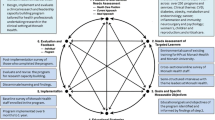Abstract
The objectives of the study were to describe the development of a patient-oriented clinical research training program in a low- or middle-income country (LMIC) setting, to describe perceived benefits of the program and barriers to application, and to make recommendations for future training programs. The program was developed by the American Society of Hematology in collaboration with Latin American stakeholders and clinical researchers. Session types were didactic, small group, and one-on-one faculty/participant dyad formats. Outcomes were assessed by quantitative surveys of trainees and qualitative feedback from both trainees and faculty members. The program is an annual 2-day course specifically for Latin American hematologists. Through course evaluations, all trainees described that the didactic sessions were relevant. All session types were useful for gaining knowledge and skills, particularly one-on-one meetings. The potential for networking was highly valued. Barriers to trainee applications were the concerns that skill level, proposed research program, and knowledge of English were not sufficiently strong to warrant acceptance into the course, and financial costs of attendance. We have described the development and initial evaluation of a clinical research training program in a LMIC setting. We learned several valuable lessons that are applicable to other research training programs.
Similar content being viewed by others
References
Lander B, Hanley GE, Atkinson-Grosjean J (2010) Clinician-scientists in Canada: barriers to career entry and progress. PLoS One 5(10). doi:10.1371/journal.pone.0013168
Shaywitz DA, Martin JB, Ausiello DA (2000) Patient-oriented research: principles and new approaches to training. Am J Med 109:136–140
Todd RF, Gitlin SD, Burns LJ (2004) Subspeciality training in hematology and oncology, 2003: results of a survey of training program directors conducted by the American Society of Hematology. Blood 103:4383–4388
Sung L, Crowther M, Byrd J, Gitlin SD, Basso J, Burns L (2014) Challenges in measuring benefit of clinical research training programs—the ASH clinical research training institute example. J Cancer Educ. doi:10.1007/s13187-014-0754-31-5
Beaglehole R, Bonita R, Alleyne G, Horton R, Li L, Lincoln P, Claude Mbanya J, McKee M, Moodie R, Nishtar S et al (2011) UN high-level meeting on non-communicable diseases: addressing four questions. Lancet 378:449–455
World Health Organization [internet]. Global action plan for the prevention and control of non-communicable diseases: 2013–2020. http://apps.who.int/iris/bitstream/10665/94384/1/9789241506236_eng.pdf?ua=1
Shah SK, Nodell B, Montano SM, Behrens C, Zunt JR (2011) Clinical research and global health: mentoring the next generation of health care students. Glob Public Health 6:234–246
International Consortium on Acute Leukemia (2015) http://www.hematology.org/Global/206.aspx. June 28
Arnold LD, Barnoya J, Gharzouzi EN, Benson P, Colditz GA (2014) A training programme to build cancer research capacity in low- and middle-income countries: findings from Guatemala. Bulletin 92:297–302
Saied L, Ellis MJ (2010) Research training in breast cancer for low and middle income countries. Oncology (Williston Park) 24:1234–1236
Acknowledgments
This work was supported by the National Cancer Institute of the National Institutes of Health [grant number R25CA168526]; the National Heart, Lung, and Blood Institute; and the National Institute of Diabetes and Digestive and Kidney Diseases of the National Institutes of Health [grant number R13HL129500]. The content is solely the responsibility of the authors and does not necessarily represent the official views of the National Institutes of Health.
Authors’ Contributions
All authors have contributed substantially to the work. LS, ER, ER, JE, JB, CPC, and JM contributed to data collection and interpretation and wrote the manuscript.
Author information
Authors and Affiliations
Corresponding author
Ethics declarations
The manuscript does not contain clinical studies or patient data.
Authors’ Disclaimers
The views expressed in this paper are that of the authors’ and not an official position of the institution or funder.
Conflict of Interest
JE, JB and CPC are employed by ASH. Otherwise, the authors declare that they have no competing interests.
Rights and permissions
About this article
Cite this article
Sung, L., Rego, E., Riva, E. et al. Development and Evaluation of a Hematology-Oriented Clinical Research Training Program in Latin America. J Canc Educ 32, 845–849 (2017). https://doi.org/10.1007/s13187-016-1015-4
Published:
Issue Date:
DOI: https://doi.org/10.1007/s13187-016-1015-4



